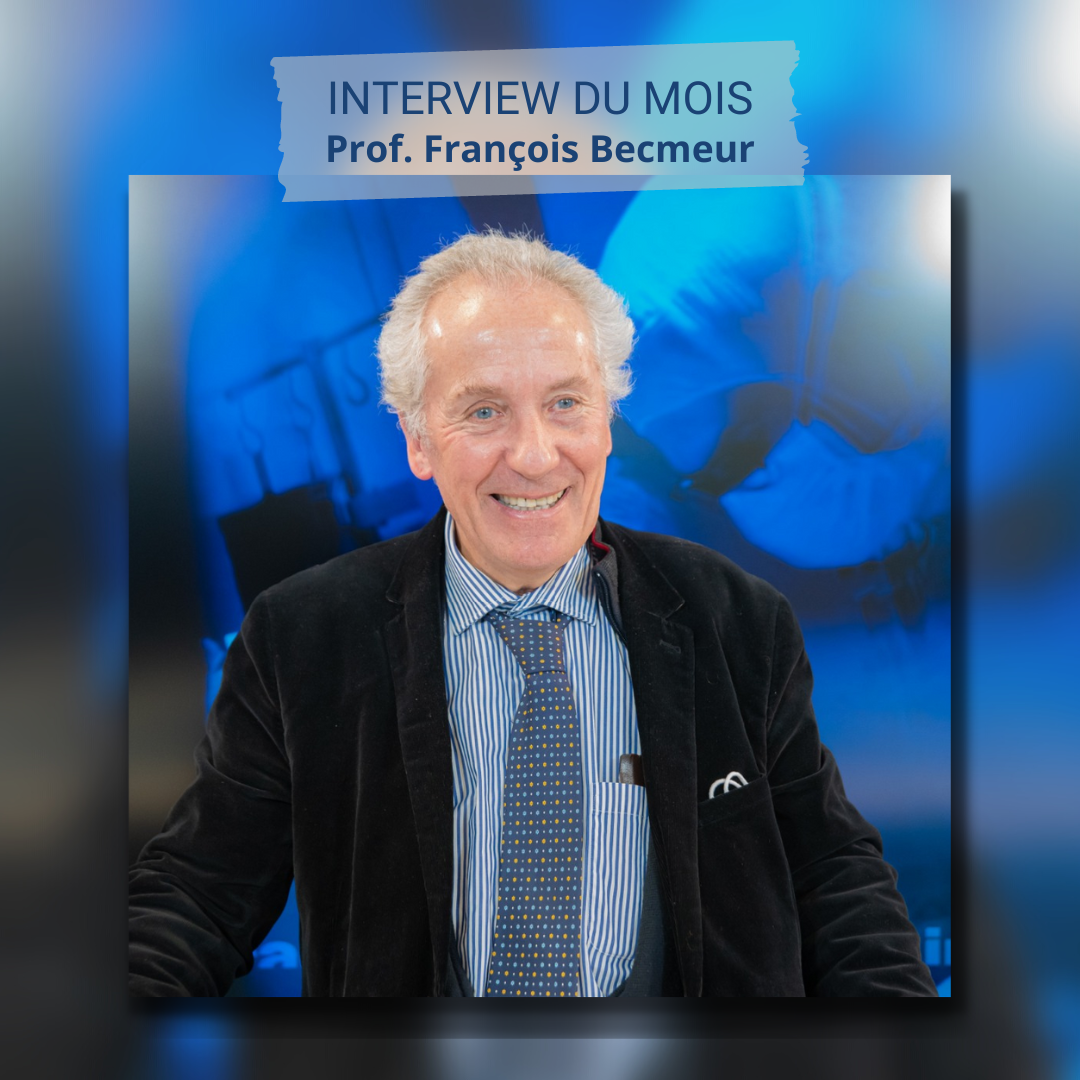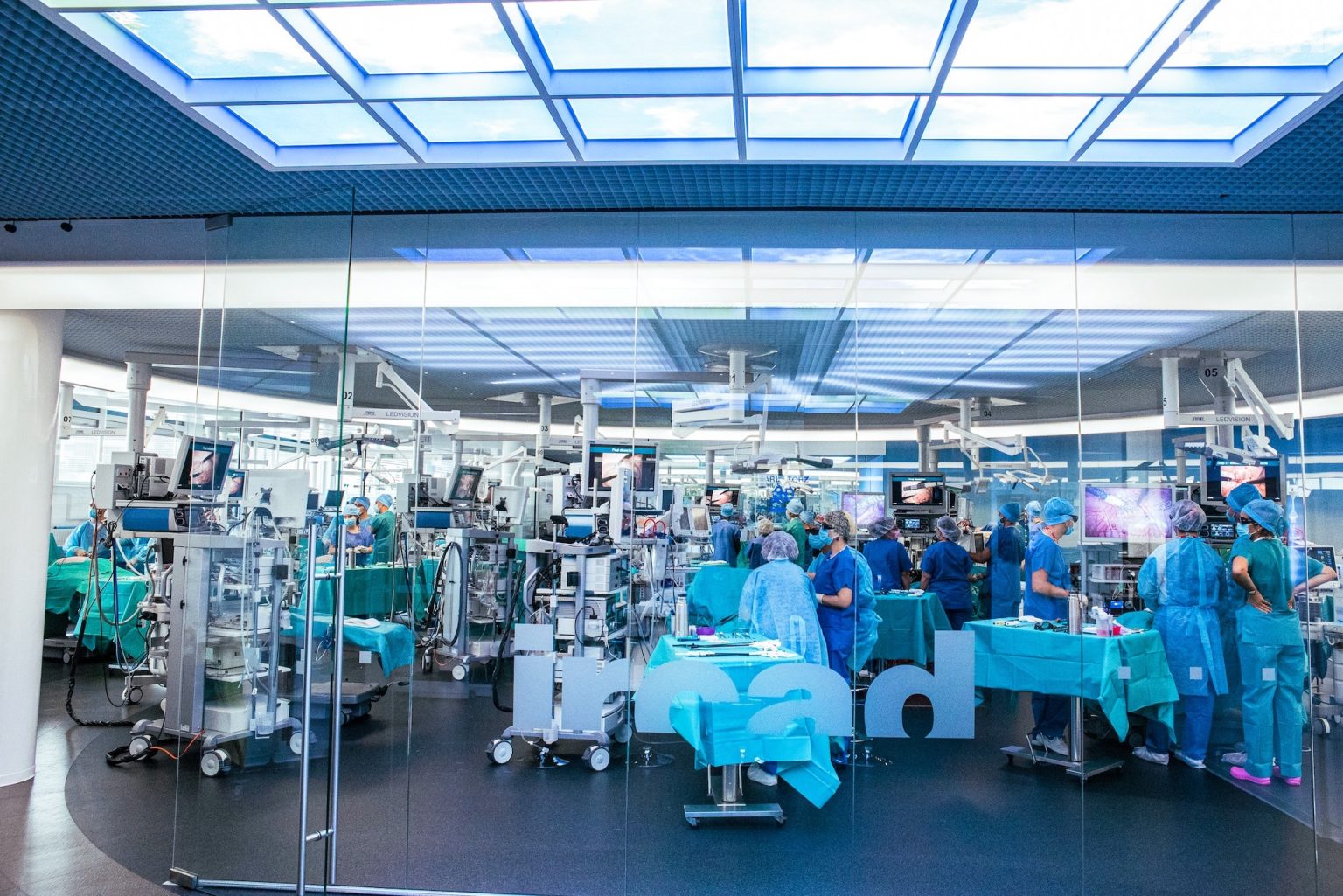
As we kick off the year 2023 and release the second issue of the IRCAD newsletter, we extend our warmest greetings and well wishes to you. The entire team at IRCAD hopes that this year brings you great success and breakthroughs.
IRCAD has exciting plans for 2023 that are particularly meaningful to us and will positively impact global patient care. Notably, we eagerly anticipate the inauguration of IRCAD Africa in Rwanda, as well as the progress of our IRCAD China and IRCAD North America projects, which are both slated to open in 2024 and 2025, respectively.
Aside from these significant milestones, it’s important to recognize the unwavering dedication of IRCAD’s national and international teams to surgical training and research. In our last newsletter, we highlighted the development of mobile solutions for cancer screening, diagnosis, and treatment, as well as the enhancement of pregnancy monitoring in Africa. In this latest edition, I would like to draw your attention to IRCAD’s initiatives in training pediatric surgeons in the latest and least invasive surgical techniques. Whether it’s reconstructive surgery for malformations or curative surgery, particularly in the treatment of childhood cancers – which holds a special significance with International Childhood Cancer Day approaching on February 15 – it’s crucial that the surgical procedures are as minimally invasive as possible.
Professor François Becmeur, a pediatric surgeon at the University Hospital of Strasbourg and a member of the International Pediatric Endosurgery Group (IPEG), leads the pediatric laparoscopic surgery courses at IRCAD. In this issue, he underscores the vital role IRCAD plays in advancing pediatric surgery.

Professor Jacques Marescaux
President and founder of IRCAD
IRCAD, a collective intelligence community dedicated to the progress of pediatric surgery

Pr François Becmeur,
pediatric surgeon
For the past 28 years, Professor François Becmeur, a dedicated pediatric surgeon, has been leading the pediatric laparoscopy courses at IRCAD.
He passionately describes the commitment of the IRCAD network’s surgeons, from sharing ideas and experiences to advocating for essential surgical tools and technologies for children.
In what way does IRCAD contribute to pediatric surgery?
The IRCAD’s role in pediatric surgery is to foster collective intelligence and provide a community for the advancement of this field. With limited resources available for pediatric surgery, it’s crucial to develop collective intelligence to drive progress forward. Through partnerships with learned societies such as IPEG, ESPES, and ESPU1, IRCAD trains surgeons under the guidance of top pediatric experts from 27 countries, facilitating friendly scientific exchanges that encourage new ideas.
In addition, IRCAD’s partner equipment manufacturers listen carefully to the surgeons’ community they train, helping to develop new tools. For instance, IRCAD had to develop new trocars for neonatal surgery. Operating on a very small child, who weighs 1.5 kg, means operating on a field as big as a matchbox. It is very complicated and when the trocars move, they hinder the surgical gesture and increase the risk of damaging the thoracic wall. After many exchanges, new trocars have been developed – they can be temporarily blocked or frozen in the thoracic or abdominal wall to prevent them from moving. This simple innovation, imagined by our friends at Hock TAN, created thanks to our exchanges with an equipment manufacturer, now helps us to carry out certain procedures, in particular in neonates. IRCAD is a sort of laboratory or catalyst for ideas.
The pediatric surgeons gathered at IRCAD can and must influence the strategic choices of laboratories: this is how, a few years ago, we lobbied with the IPEG for the maintenance and development of 3mm trocars, which are essential in pediatric surgery. The relationship of trust established to advance innovation allows us to be heard and to fight for our patients.
Out of IRCAD’s various innovations, which ones have had a noteworthy influence on pediatric surgery, specifically in the field of oncology?
The Visible patient simulation technology, developed by Luc Soler’s teams within the IRCAD network, and which is now flourishing in an autonomous company, has progressed a great deal in fifteen years and has introduced many benefits. By reconstructing the patient in 3D, it allows to prepare the operation by simulating it. The different therapeutic options can be tested on the digital duplicate of the patient, which offers the possibility to choose the best therapeutic strategy in order to obtain better results. In addition, it is possible to use this simulation to explain the surgical procedure to families and sometimes, when they are old enough to understand, to young patients. This technology is very useful in the surgery of rare malformations and in the field of childhood tumors.
In oncology surgery, we seek to cure the patient while avoiding side effects in order to preserve his or her quality of life in the long term: we seek to limit the size of the scar or the impact of the surgery on neighboring organs. To achieve this – I use the example of certain kidney tumors – we must be able to answer these questions: what is the vascular target (arteries and veins) that will allow a complete removal of the tumor while sparing as much healthy tissue as possible? How to reconstruct the urinary excretory tract in order to leave an organ that is not only alive but also functional. Simulation is essential to answer these questions.
You brought up the issue of scars – could IRCAD’s pioneering work in flexible endoscopic surgery have potential applications in some pediatric surgery cases?
This is a promising avenue of research. At IRCAD, Professor Silvana Perretta, a specialist and pioneer in flexible endoscopy for adults, is conducting research on esophageal atresia, a malformation that leads to the abnormal closure of the esophagus in newborns. This research is an example of the exchange between pediatric and adult surgeons. The goal of this approach is to minimize the invasiveness of the procedure and any potential side effects that may arise. This is known as parietal sparing.
Could you please elaborate on the concept of parietal sparing?
The surgical procedure performed on young children is highly invasive, although laparoscopy has reduced its aggressiveness to some extent. In thoracoscopic surgery, the use of finely adapted trocars enables us to avoid deformations of the thoracic cavity caused by friction and instrument support during the procedure. This is particularly crucial for neonates and small infants, as the long-term consequences of injuries resulting from an invasive procedure can be significantly amplified by growth and may lead to significant abnormalities such as costal synostosis2 and scoliosis. We strive to prevent such complications from occurring.
Could you provide other approaches that could help minimize the surgery invasiveness?
The data generated through monitoring performed by anesthesiologists is substantial. Artificial intelligence will allow us to achieve better control over surgical actions in order to mitigate risks for the child in the long run. For instance, during laparoscopic surgery, it is necessary to insufflate carbon dioxide into the child’s abdomen or thorax to create the required space. However, excessive insufflation pressure can compromise the child’s ventilation and cerebral microvascularization, among other factors. Artificial intelligence will prove highly beneficial in regulating different parameters and maintaining the delicate balance required in pediatric surgery.
What technological innovations are expected to generate new advances in pediatric surgery?
Artificial intelligence has been mentioned in relation to its role in assisting surgeons in making informed decisions, particularly through simulation, and in enhancing patient monitoring during surgical procedures. Robotics is also seen as a valuable asset, although its advantages still require scientific validation. The implementation of a dual-control robot enables us to aid less experienced surgeons in mastering surgical techniques without exposing patients to increased risks, while facilitating the training of new surgeons. This advancement also facilitates the development of a standardized and reproducible skill set for all surgeons, which is crucial. With the integration of technologies like artificial intelligence, simulation, and robotic surgery, all surgeons will be able to achieve a high level of proficiency. The progress in these technologies provides us with a means to enhance surgeons’ capabilities and promote equitable access to quality care for patients worldwide.
1 IPEG : International Pediatric Endosurgery Group
ESPES European Society of Paediatric Endoscopic Surgeons
ESPU : European Society for Paediatric Urology
2 Costal synostosis: a condition characterized by the fusion of two ribs, which may occur due to trauma and results in skeletal imbalance.
About IRCAD:
Established in 1994 by Professor Jacques Marescaux, IRCAD is a specialized institution focused on advancing research and training in the field of minimally invasive surgery. Based in Strasbourg, IRCAD has gained global recognition for its exceptional training programs, which attract around 8,800 surgeons from across the world annually, both in-person and through the free online Websurg university, boasting over 470,000 registered members worldwide. Stay up-to-date with IRCAD’s latest developments on Twitter, Instagram, Facebook or LinkedIn.
For more information: https://www.ircad.fr/
Press contacts:
FINN Partners – sante@finnpartners.com
Don’t miss the latest news from IRCAD.
Sign up here for our newsletters and communication mailings
to stay informed about us and our courses

Please note that the IRCAD administrative board and staff are closely monitoring the evolving COVID-19 situation, in full compliance with all applicable laws and regulations in France. The health, safety, and well-being of our participants, experts and staff are our top priority!
Despite the current context, the IRCAD stands firmly by your side to help you acquire knowledge and skills. Come and join us !
We would like to draw your attention that the « Vaccine Pass » is now mandatory in France since end of January 2022 and replaces the former « Health Pass » to access places that are open to the public, such as cinemas, museums, cafés and restaurants, hotels as well as the IRCAD Institute which welcomes participants in the framework of its courses and seminars. Thus, a PCR test without vaccination is no longer sufficient to take part in our courses.
The vaccine pass includes a proof of the following (one of the 3 items is sufficient):
Further information about the new vaccine pass can be found at :
We very much hope to be able to count on your kind understanding of those rules which have been set by the French Government and which our Institute is required to apply